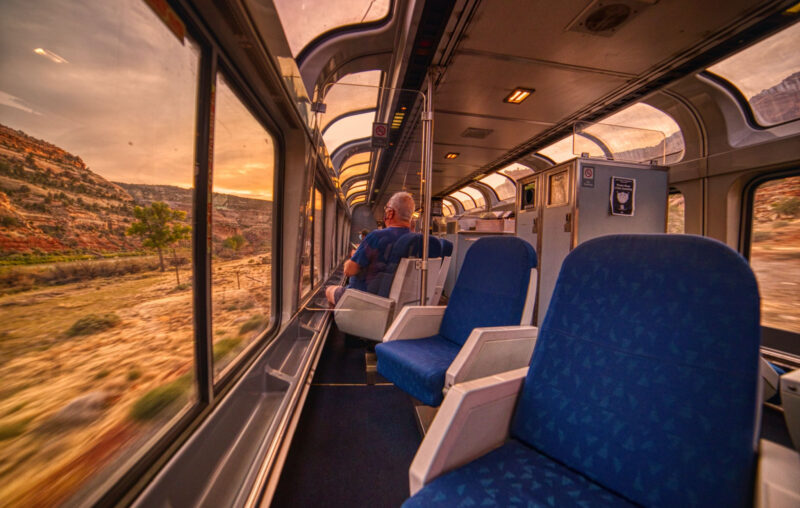A Profound Misdiagnosis of American Transit

New York Times editor David Leonhardt recently claimed that Americans spend more time commuting than they did twenty, thirty, and forty years ago. Traffic congestion in major urban areas has worsened. Air travel takes longer. The train from NYC to DC runs slower. It takes over thirty minutes to get from Times Square to La Guardia, while the Chinese make a longer trip from downtown Shanghai to the airport in just ten minutes.
These are all interesting observations. But what has caused these delays?
Remarkably, Leonhardt says the culprit is decades of declining investment by the US government in research and development. If that surprises you, you’re not alone. How can declining government investment spending on research and development contribute to rising commuting times?
Leonhardt claims that we need massive public investment to update airports and train stations, build new transit infrastructure, improve technology, and expand road networks. The private sector, he says, has little reason to invest in these things.
But Leonhardt is mistaken.
He has profoundly misunderstood how transportation can and ought to work. While he claims that we lack bullet trains and state-of-the-art airports because of insufficient government investment, governments have, in fact, spent massive amounts of money on transit. Over a trillion dollars is spent annually in the US on infrastructure. The real problem is how much more expensive governments have made it to build mass transit systems and how much money they waste in doing so.
Government regulations and policies have made our commutes worse.
Why does air travel take longer than in the past? Well, required TSA scanning adds 30-60 minutes to most trips. We don’t need a massive federal bureaucracy that provides the illusion of safe air travel. Let airlines and airports take care of their own security.
Why is Acela slow? Because it is run by Amtrak, a government agency. They have little incentive to invest in better equipment or other improvements. Or consider another government agency, NJ Transit, that will likely run a deficit of over a billion dollars this year. Private entrepreneurs would never run Amtrak or NJ Transit the way they are being run. They would have too much to lose.
Unfortunately, Leonhardt and many of his readers don’t seem to understand the importance of incentives and market capitalism. It’s not just that a privately-owned Amtrak or private airport security would be run better. They would be run differently, and they would become increasingly different over time with the introduction of new methods and technology.
If we really want better travel options, we should rely on the private sector.
The private sector built the New York City subway system over a century ago, after all. The private companies who did that building, though, were then run out of town by politicians so that the city could take over. And it has been one long story of decline ever since, with one expensive exception.
Contrast NYC’s initial private subway construction with California’s attempt to build high-speed rail. With over $5 billion dollars spent and next to no track laid, the project is all but dead. Projected costs are at least five times higher than initial estimates, even as the powers-that-be have begun lopping off routes. As commentators have observed, it has become a high-speed “train to nowhere.”
CA’s high-speed rail project did not fail due to a lack of government spending on research and development. It failed because labor unions, environmentalists, lobbyists, and a lack of accountability drove up costs. But beyond all that, the project never really made economic sense. It was simply a much more expensive way of transporting people than air travel – which is part of why the proposed high-speed rail project in Texas is floundering too.
The high-speed transit systems of other countries are not perfect either or the result of wise public investment in R&D. They are either heavily subsidized, such as SNCF in France or KORAIL in S. Korea, or semi-private as in Japan, with extremely dense populations. The solution to “public transit” deficiencies in U. S. cities is to remove “public” from the transit.
But won’t private transit ignore poor people and be corrupted by greed? Not if local grocery, hardware, or tech stores are any guide. Or the far more difficult launching of payloads into space.
Privately run mass transit systems will reduce costs and improve quality. Air travel and private toll roads are great examples of how private companies will invest in productive improvements. They innovate in ways that make their customers’ lives better. And they run their enterprises far more efficiently, including maintenance, because they want to have profits rather than losses. They will benefit those who cannot afford to live near their place of employment the most.
Publicly owned and operated transit systems in the US are dinosaurs of the 20th century. It’s time to recognize that transportation, just like food, fuel, clothing, and every other economic good, can be provided by private market actors with higher quality and at lower cost than government agencies.
We don’t need a resurgence of government spending on research and development to get more innovation in our transit systems.
We just need governments to get out of the way!










